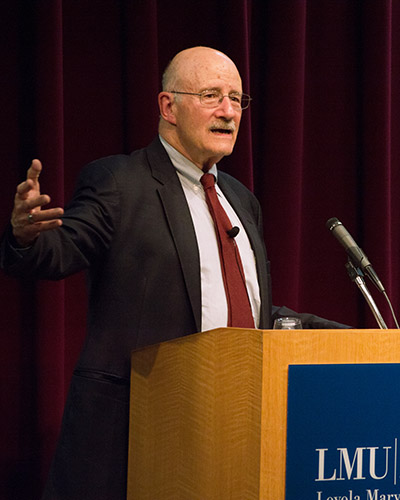
The Dreier Chair in Accounting Ethics Distinguished Speaker Series welcomed Steven Burdick, executive vice president and CFO of Tetra Tech, on the evening of September 26 to discuss “Environmental, Social and Governance (ESG) Challenges and Opportunities.”
The changing regulatory and political environment presents new challenges and opportunities for environmental, social and governance practices. Burdick discussed Tetra Tech’s business model; sustainability initiatives and sustainability reporting; the impact of the changing regulatory and political environment on environmental, social and governance practices; and shareholder value and long-term investment returns.
Pasadena-based Tetra Tech is a consulting and engineering firm focused on water, the environment and infrastructure projects. Burdick, a graduate of Loyola High and Santa Clara University, was taught the importance of social issues at an early age and grew up wanting to make a difference in people’s lives. Tetra Tech is the perfect fit for him. The company works in a lot of developing countries to provide water and electricity systems, and partners with nonprofit groups such as Engineers Without Borders and the STEM Education Coalition. Recent projects include the Panama Canal Expansion, Inner Harbor Navigation Canal, a U.S. Army facility in Utah powered by the sun, and a smart, sustainable city in Kenya that serves 200,000 people.
In 2011, Tetra Tech began measuring sustainability efforts and setting standards for its projects. It’s not just ESG but economic issues as well; companies need to be able to measure and figure out if they’ve been successful. While more companies today are reporting on sustainability, there is no single reporting standard; it is very fragmented. In 2015, 81% of S&P 500 companies were involved in sustainability reporting.
Since the 2016 election, ESG funding has increased 75%. Why? Because environmental protection drives economic growth and capitalism drives innovation. 85% of investors use qualitative information to make investment decisions. Intangible assets account for 80% of a company’s reporting. A higher percentage of women and millennials are now investing in ESG funds. So why are people investing in ESG funds?
- Risk management/mitigation
- Innovation
- Cost savings
- Premiums on stock multiples
- Improved retention/morale
- Better stock performance
“As more investors link sustainability with financial returns, they press companies for meaningful ESG disclosures,” said Burdick. “As a company, if you ignore ESG, you will be worth less.”
The Dreier Chair in Accounting Ethics Distinguished Speaker Series is part of the activities and events of the Institute for Business Ethics and Sustainability (IBES) at Loyola Marymount University. (Note: This was formerly the Center for Accounting Ethics, Governance, and the Public Interest’s Distinguished Speakers Series.)



